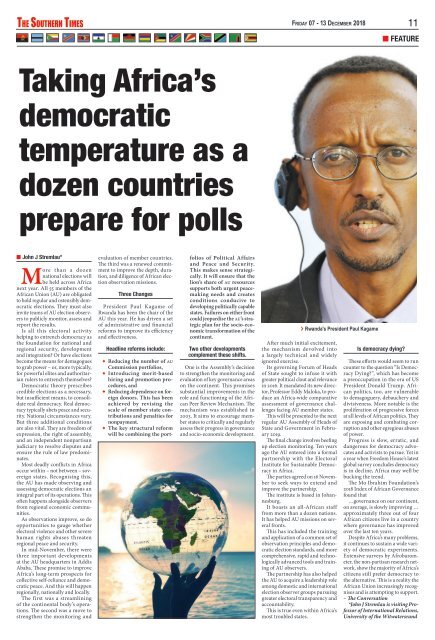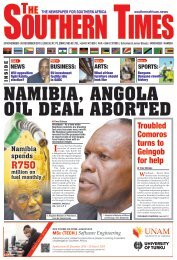Create successful ePaper yourself
Turn your PDF publications into a flip-book with our unique Google optimized e-Paper software.
<strong>The</strong> <strong>Southern</strong> <strong>Times</strong> Friday 07 - 13 December 2018<br />
11<br />
■ FEATURE<br />
Taking Africa’s<br />
democratic<br />
temperature as a<br />
dozen countries<br />
prepare for polls<br />
■ John J Stremlau*<br />
More than a dozen<br />
national elections will<br />
be held across Africa<br />
next year. All 55 members of the<br />
African Union (AU) are obligated<br />
to hold regular and ostensibly democratic<br />
elections. <strong>The</strong>y must also<br />
invite teams of AU election observers<br />
to publicly monitor, assess and<br />
report the results.<br />
Is all this electoral activity<br />
helping to entrench democracy as<br />
the foundation for national and<br />
regional security, development<br />
and integration? Or have elections<br />
become the means for demagogues<br />
to grab power – or, more typically,<br />
for powerful elites and authoritarian<br />
rulers to entrench themselves?<br />
Democratic theory prescribes<br />
credible elections as a necessary,<br />
but insufficient means, to consolidate<br />
real democracy. Real democracy<br />
typically abets peace and security.<br />
National circumstances vary.<br />
But three additional conditions<br />
are also vital. <strong>The</strong>y are freedom of<br />
expression, the right of assembly,<br />
and an independent nonpartisan<br />
judiciary to resolve disputes and<br />
ensure the rule of law predominates.<br />
Most deadly conflicts in Africa<br />
occur within – not between – sovereign<br />
states. Recognising this,<br />
the AU has made observing and<br />
assessing democratic elections an<br />
integral part of its operations. This<br />
often happens alongside observers<br />
from regional economic communities.<br />
As observations improve, so do<br />
opportunities to gauge whether<br />
electoral violence and other severe<br />
human rights abuses threaten<br />
regional peace and security.<br />
In mid-November, there were<br />
three important developments<br />
at the AU headquarters in Addis<br />
Ababa. <strong>The</strong>se promise to improve<br />
Africa’s long-term prospects for<br />
collective self-reliance and democratic<br />
peace. And this will happen<br />
regionally, nationally and locally.<br />
<strong>The</strong> first was a streamlining<br />
of the continental body’s operations.<br />
<strong>The</strong> second was a move to<br />
strengthen the monitoring and<br />
evaluation of member countries.<br />
<strong>The</strong> third was a renewed commitment<br />
to improve the depth, duration,<br />
and diligence of African election<br />
observation missions.<br />
Three Changes<br />
President Paul Kagame of<br />
Rwanda has been the chair of the<br />
AU this year. He has driven a set<br />
of administrative and financial<br />
reforms to improve its efficiency<br />
and effectiveness.<br />
Headline reforms include:<br />
◆◆<br />
Reducing the number of AU<br />
Commission portfolios,<br />
◆◆<br />
Introducing merit-based<br />
hiring and promotion procedures,<br />
and<br />
◆◆<br />
Reducing dependence on foreign<br />
donors. This has been<br />
achieved by revising the<br />
scale of member state contributions<br />
and penalties for<br />
nonpayment.<br />
◆◆<br />
<strong>The</strong> key structural reform<br />
will be combining the portfolios<br />
of Political Affairs<br />
and Peace and Security.<br />
This makes sense strategically.<br />
It will ensure that the<br />
lion’s share of AU resources<br />
supports both urgent peacemaking<br />
needs and creates<br />
conditions conducive to<br />
developing politically capable<br />
states. Failures on either front<br />
could jeopardise the AU’s strategic<br />
plan for the socio-economic<br />
transformation of the<br />
continent.<br />
Two other developments<br />
complement these shifts.<br />
One is the Assembly’s decision<br />
to strengthen the monitoring and<br />
evaluation of key governance areas<br />
on the continent. This promises<br />
substantial improvements in the<br />
role and functioning of the African<br />
Peer Review Mechanism. <strong>The</strong><br />
mechanism was established in<br />
2003. It aims to encourage member<br />
states to critically and regularly<br />
assess their progress in governance<br />
and socio-economic development.<br />
After much initial excitement,<br />
the mechanism devolved into<br />
a largely technical and widely<br />
ignored exercise.<br />
Its governing Forum of Heads<br />
of State sought to infuse it with<br />
greater political clout and relevance<br />
in 2016. It mandated its new director,<br />
Professor Eddy Maloka, to produce<br />
an Africa-wide comparative<br />
assessment of governance challenges<br />
facing AU member states.<br />
This will be presented to the next<br />
regular AU Assembly of Heads of<br />
State and Government in February<br />
2019.<br />
<strong>The</strong> final change involves beefing<br />
up election monitoring. Ten years<br />
ago the AU entered into a formal<br />
partnership with the Electoral<br />
Institute for Sustainable Democracy<br />
in Africa.<br />
<strong>The</strong> parties agreed on 16 November<br />
to seek ways to extend and<br />
improve the partnership.<br />
<strong>The</strong> institute is based in Johannesburg.<br />
It boasts an all-African staff<br />
from more than a dozen nations.<br />
It has helped AU missions on several<br />
fronts.<br />
This has included the training<br />
and application of a common set of<br />
observation principles and democratic<br />
election standards, and more<br />
comprehensive, rapid and technologically<br />
advanced tools and training<br />
of AU observers.<br />
<strong>The</strong> partnership has also helped<br />
the AU to acquire a leadership role<br />
among domestic and international<br />
election observer groups pursuing<br />
greater electoral transparency and<br />
accountability.<br />
This is true even within Africa’s<br />
most troubled states.<br />
› Rwanda's President Paul Kagame<br />
Is democracy dying?<br />
<strong>The</strong>se efforts would seem to run<br />
counter to the question “Is Democracy<br />
Dying?”, which has become<br />
a preoccupation in the era of US<br />
President Donald Trump. African<br />
politics, too, are vulnerable<br />
to demagoguery, debauchery and<br />
divisiveness. More notable is the<br />
proliferation of progressive forces<br />
at all levels of African politics. <strong>The</strong>y<br />
are exposing and combating corruption<br />
and other egregious abuses<br />
of power.<br />
Progress is slow, erratic, and<br />
dangerous for democracy advocates<br />
and activists to pursue. Yet in<br />
a year when Freedom House’s latest<br />
global survey concludes democracy<br />
is in decline, Africa may well be<br />
bucking the trend.<br />
<strong>The</strong> Mo Ibrahim Foundation’s<br />
2018 Index of African Governance<br />
found that<br />
…governance on our continent,<br />
on average, is slowly improving …<br />
approximately three out of four<br />
African citizens live in a country<br />
where governance has improved<br />
over the last ten years.<br />
Despite Africa’s many problems,<br />
it continues to sustain a wide variety<br />
of democratic experiments.<br />
Extensive surveys by Afrobarometer,<br />
the non-partisan research network,<br />
show the majority of Africa’s<br />
citizens still prefer democracy to<br />
the alternative. This is a reality the<br />
African Union increasingly recognises<br />
and is attempting to support.<br />
– <strong>The</strong> Conversation<br />
*John J Stremlau is visiting Professor<br />
of International Relations,<br />
University of the Witwatersrand




